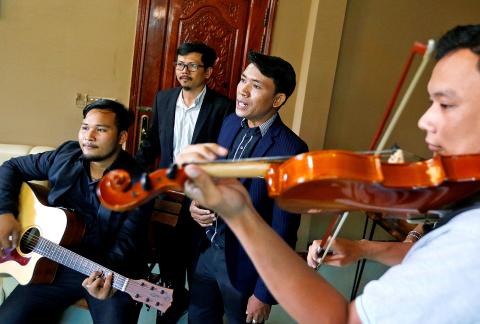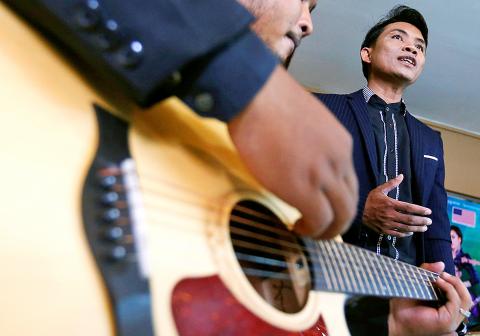With US-Cambodian relations at a low and Chinese influence growing, Washington is trying a new way to win hearts and minds: sponsoring a well-known Cambodian musician to sing positive songs about America.
“When there is tension, countries seek ways to ease it so arts and culture can help,” said 37-year-old Yorn Young, who launched his Lovin’ USA album in Phnom Penh on Tuesday last week. He was not worried if people thought it was propaganda, he added.
Yorn Young said he was getting over US$10,000 from the US for a concert on Saturday last week in Kampong Thom province, north of the capital. More concerts could follow if it is a success.

Photo: Reuters
Diplomatic ties between the US and Cambodia have worsened during a crackdown on opponents of authoritarian leader Hun Sen, who has ruled the Southeast Asian country for 33 years and made it one of China’s closest regional allies.
The US scaled back aid after the main opposition leader was arrested and his party banned ahead of an election in July. Planned aid for Cambodia has also been reduced as part of more general cuts under US President Donald Trump.
Meanwhile, the government accuses the US of supporting opposition plots to win power.

Photo: Reuters
Yorn Young’s music could help improve the relationship, the US embassy said.
“I think it brings us closer together,” said Cultural Affairs Officer Monica Davis.
Hun Sen often reminds Cambodians about devastating US bombing that began in the late 1960s and a coup by a US-backed general in 1970. Shortly afterwards, US troops invaded from Vietnam and war engulfed the country, leading to the takeover by the genocidal Khmer Rouge in 1975.
Public opinion towards the United States in generally favorable, however. A 2016 survey showed that 85 percent of Cambodians had a positive view of the US impact on the region.
LOST TO CHINA
“From America’s perspective, they have lost Cambodia to China. What they continue to possess is the goodwill of the Cambodian people,” said political commentator Ou Virak.
“In terms of soft power, America is still miles ahead of China ... but China is catching up and the Trump presidency is adding a huge boost to that.”
The songs on the album Lovin’ USA: Yorn Young Journey Across America are about the beauty of US cities and states that he visited in recent years on trips funded by the US government.
“Cannot believe it’s real. Smiling scenery so appealing,” are the Khmer lyrics of Florida, Florida, sung in a slow and sentimental style.
The US remained very important to Cambodians, Yorn Young said.
“In Cambodia, people spend US dollars, the Internet is American, everything is American,” said Yorn Young, who has also performed at Cambodian government-sponsored concerts and said he had a good relationship with government officials.
Sok Eysan, a spokesman for the ruling Cambodian People’s Party, welcomed the musical initiative as a positive sign — while also condemning the Trump administration’s “support of its puppet, the opposition party.”
The US has dismissed accusations of American backing for an alleged plot by opposition leader Kem Sokha, who faces treason charges he says were intended to stop him contesting the election.
The White House said last week it was suspending or curtailing several Treasury, USAID and military assistance programs that support Cambodia’s military, taxation department and local authorities.
Hun Sen has challenged the US to cut off aid altogether and pointed to Cambodia’s growing help from China.
According to official figures, Cambodia expects more than US$260 million from China in bilateral aid in 2018 — more than seven times as much as from the United States.
Most Chinese aid goes to big projects such as dams, roads and power grids rather than “soft power” initiatives.

Dec. 16 to Dec. 22 Growing up in the 1930s, Huang Lin Yu-feng (黃林玉鳳) often used the “fragrance machine” at Ximen Market (西門市場) so that she could go shopping while smelling nice. The contraption, about the size of a photo booth, sprayed perfume for a coin or two and was one of the trendy bazaar’s cutting-edge features. Known today as the Red House (西門紅樓), the market also boasted the coldest fridges, and offered delivery service late into the night during peak summer hours. The most fashionable goods from Japan, Europe and the US were found here, and it buzzed with activity

During the Japanese colonial era, remote mountain villages were almost exclusively populated by indigenous residents. Deep in the mountains of Chiayi County, however, was a settlement of Hakka families who braved the harsh living conditions and relative isolation to eke out a living processing camphor. As the industry declined, the village’s homes and offices were abandoned one by one, leaving us with a glimpse of a lifestyle that no longer exists. Even today, it takes between four and six hours to walk in to Baisyue Village (白雪村), and the village is so far up in the Chiayi mountains that it’s actually

These days, CJ Chen (陳崇仁) can be found driving a taxi in and around Hualien. As a way to earn a living, it’s not his first choice. He’d rather be taking tourists to the region’s attractions, but after a 7.4-magnitude earthquake struck the region on April 3, demand for driver-guides collapsed. In the eight months since the quake, the number of overseas tourists visiting Hualien has declined by “at least 90 percent, because most of them come for Taroko Gorge, not for the east coast or the East Longitudinal Valley,” he says. Chen estimates the drop in domestic sightseers after the

US Indo-Pacific Commander Admiral Samuel Paparo, speaking at the Reagan Defense Forum last week, said the US is confident it can defeat the People’s Republic of China (PRC) in the Pacific, though its advantage is shrinking. Paparo warned that the PRC might launch a “war of necessity” even if it thinks it could not win, a wise observation. As I write, the PRC is carrying out naval and air exercises off its coast that are aimed at Taiwan and other nations threatened by PRC expansionism. A local defense official said that China’s military activity on Monday formed two “walls” east